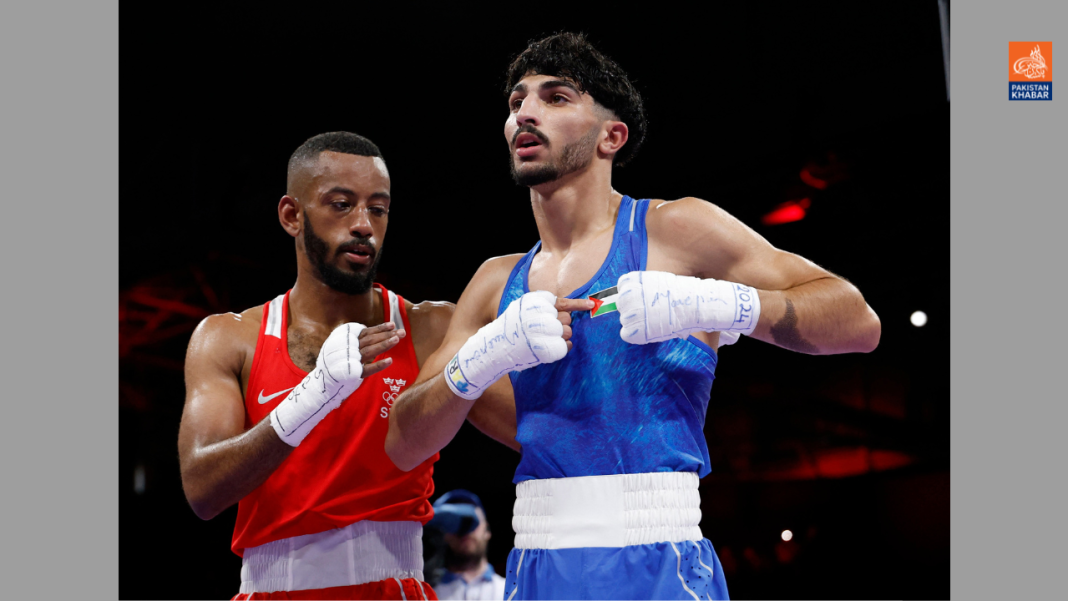As Israeli and Palestinian judokas took to the tatami mats at the Paris Olympics on Tuesday, the ongoing war in their homeland was at the forefront of their minds.
Both athletes—one from each side—fought and lost to separate opponents.
After their defeats, they conveyed different messages, highlighting the personal nature of the conflict for the competitors and the challenges faced by the organizers in fostering an Olympic truce after 10 months of conflict between Israel and Palestinian Hamas militants in Gaza.
“I believe the Olympics are about making peace, but if there’s war in our country and peace here, it feels hypocritical,” said Feras Badawi, one of eight Palestinian athletes at the Games, after losing his first-round match in the under 81 kg category against Tajik Somon Makhmadbekov.
He stated that he could never compete against or shake hands with Israeli athletes while the conflict in Gaza persists, which has resulted in at least 39,400 Palestinian deaths following Israel’s offensive against Hamas in response to the October 7 attack on southern Israel that killed 1,200 people.
Shortly afterward, in the women’s under 63 kg category, Israeli judoka Gili Sharir, who lost to reigning French Olympic champion Clarisse Agbegnenou, also addressed the broader political context in her post-match comments.
“We can’t ignore what’s happening, but we can use it to our advantage. I believe in Israel, I love Israel, and it was an honor to compete with the Israeli flag on my chest,” said Sharir, one of the 88 Israeli athletes in Paris.
She noted that as an Israeli athlete, she was accustomed to opponents refusing to shake her hand, but she wished that sport could take precedence over politics.
The exchanges at the Champs de Mars arena came after an Algerian judoka was disqualified on Monday to avoid a potential match-up with an Israeli, highlighting how the conflict has affected the start of the Olympics.
Before the Games, there were concerns about widespread protests. Events featuring Israeli athletes were anticipated to draw significant anti-Israeli demonstrations, but these have been sporadic.
Palestinian flags have been waved, and some banners have called for a “Free Palestine” or accused Israel of genocide—a charge Israel denies.
There have been vitriolic chants at football matches, and French prosecutors have opened an investigation into death threats against Israeli athletes, a concerning development 52 years after 11 Israelis were killed at the Munich Games in 1972.
Verbal clashes have primarily involved officials from both delegations defending their positions.
At the opening ceremony, Palestinian athletes wore political symbols on their jackets, prompting criticism from Israeli officials, who claimed they had violated the Olympic charter.
From the outset, the Palestinian Olympic Committee (POC) sent letters to the International Olympic Committee (IOC) and the International Football Federation, requesting Israel’s suspension over the war, which it equated to Russia’s suspension over its assault on Ukraine.
On Tuesday, POC chief Jibril Rajoub, who spent 17 years in Israeli prisons, criticized the IOC for double standards, accusing it of ignoring its charter and outlining the heavy toll the war has taken on Palestinian athletes.
He accused some Israeli athletes of glorifying the war on social media, particularly targeting Israel’s judoka flagbearer Peter Paltchik for a media post.
“Is he fit to represent Israel at such a global, peaceful, humanitarian event?” Rajoub asked reporters. “They should show a red card to Israel.” The Israeli embassy in Paris dismissed Rajoub’s claims, calling it a “smear campaign” to “discredit and hurt him using lies and deception.”
Israeli Olympic Committee officials responded strongly. Yael Arad described Rajoub as a “convicted terrorist.”
“People can cheer for whomever they want, but it’s disgraceful to use the arena for political attacks against Israeli athletes,” she said.
“But we choose to see the positive. We see the Israeli flag as a symbol of resilience following October 7,” the former Olympic judoka said.




